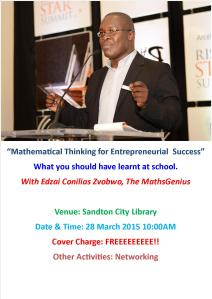How can mathematics give an unfair advantage to entrepreneurs?
George Pólya, one of the most influential mathematicians of the twentieth century, said that “mathematics is not a spectator sport”. Entrepreneurs, like mathematicians, do not sit in the spectator’s box, they are doers who improve the economy through the creation of new ideas, products and firms. But are there any other analogies between mathematics and entrepreneurship? Can mathematics training give an advantage to entrepreneurs?
A study by Saras Sarasvathy, a cognitive scientist, showed that expert entrepreneurs share a common way of thinking that defines them. Contrary to common belief, entrepreneurs do not use “causal thinking”. The latter is mostly followed by managers who employ given means to achieve predetermined goals. In contrast, entrepreneurs use “effectual thinking”. They form new ideas and imagine new possibilities based on available means.
While causal reasoning does not necessarily involve creative thinking, creativity is an innate attribute of effectual reasoning. To contrast the two types of reasoning, Saras Sarasvathy gives as an example the task of cooking a meal. A chef who prepares a specific menu by looking for the right ingredients and following the recipes for the dishes in the menu, follows a causal process. In the effectual process the chef is not given a menu and is asked to cook a meal with the available ingredients.
Effectual thinking is a heuristic way of reasoning that requires imagination and risk-taking. And it this heuristic attribute of the entrepreneurial reasoning that makes mathematical training advantageous to any aspiring entrepreneur.
A heuristic is a problem solving technique, widely used in mathematics, whose purpose is to discover. It involves creating a speculative formulation and then use investigation to reach an outcome. In 1994, Saunders Mac Lane, offered intuition, trial, error, speculation, conjecture, proof as the sequence in which we come to understand and develop mathematics. My task here is to explore whether this reasoning sequence is relevant to entrepreneurship.
Intuition emerges from existing knowledge and experience. Ideas, like money, do not fall from a helicopter. Mathematicians and entrepreneurs get ideas for their next research project or venture from what they know and what they are good at.
Trial and error is used to test whether an idea works. Trial and error is a process with an uncertain outcome during which new knowledge and experience is gained. Trying out an idea for the first time can be daunting. It is the phase of discovery that one is faced with uncharted territory. It is the time that one has to face and deal with failure. Mathematicians learn to do this by viewing every failed trial as a step closer to success. A failed trial just eliminates one possible path and improves one’s insight about what does and what does not work. Trial and error is a dynamic process where the original idea is tested, shaped and re-shaped. At the end of this process either we have an idea that seems workable or we are looking for new goals. Is this process any different for entrepreneurs? Mathematicians and entrepreneurs learn to embrace failure and uncertainty.
Speculation After a sufficient number of trials and errors one is now able to make an informed guess on whether the initial intuition led to a workable idea.
Conjecture For a mathematician a conjectured is a proposition that seems to be correct (based on the previous process) and needs to be proven. For an entrepreneur it could be a new product or service that needs consumer approval.
Proof is the last step of the investigation and it can lead either to success or to failure. A mathematician needs to use rigorous analytical tools to verify the conjecture and an entrepreneur needs to devise a marketing strategy to promote a new product and gain customer support. Although proof seems to be the last step in a creative reasoning process it is also the first for the next idea.
Based on my knowledge and experience I feel that pure mathematical training could be beneficial to an entrepreneur’s first steps in a new venture. This post is the first trial of this seemingly bizarre idea. Do you concur with this rational?
Dr Eleni Katirtzoglou is a Guest Lecturer at the London School of Economics and Political Science
Source: https://www.linkedin.com/pulse/20140708183646-131466034-how-can-mathematics-give-an-unfair-advantage-to-entrepreneurs

how to get hold of your book
LikeLike